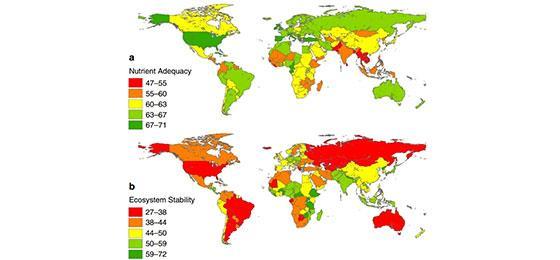Multi-indicator sustainability assessment of global food systems
26.03.2018
Sustainability of national food systems compared in 156 countries through 25 indicators. Most high-income countries including Switzerland perform well on social indicators but poorly on environmental, food waste and health sensitive nutrition indicators.
Food systems around the world face increasing challenges to meet human nutrition needs in sustainable ways. There has been a lack of quantitative approaches for measuring the performance of these complex systems. The Institute of Food, Nutrition and Health at ETH Zurich carried out the first-ever global assessment of national food system performance of 156 countries, employing 25 sustainability indicators across seven metrics spanning nutrition, environment and social domains.
The results show that no country can claim to have perfectly sustainable food systems. Switzerland, like most high-income countries, scores well on most social indicators, but poorly on environmental, food waste and health sensitive nutrition indicators. Low-income countries have low per-capita food related environmental footprint but perform poorly in nutrition and social indicators.
While replacing animal-based foods with plant-based alternatives would improve the environmental profile of the individual diet, it may result in deficiency of certain micronutrients (e.g. selenium, vitamins B12, etc.) and therefore may require supplementation. The nation-specific quantitative results can help policy-makers set improvement targets on specific areas and adopt new practices while tracking all other sustainability indicators.
The article was published in Nature Communications on 27 February 2018.
